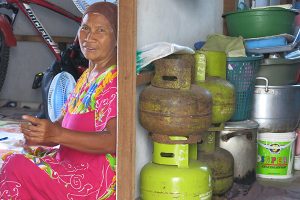The economies have been hit already—we now need palliatives and ultimately cures
by Akhand Tiwari, Doreen Ahimbisibwe, Agnes Salyanty, Manoj Pandey, Rahul Chatterjee and Rahmatika Febrianti
Apr 14, 2020
6 min
An economic pandemic is upon us as the COVID-19 infection continues to spread around world, affecting a billion people from the low-income segment. Our blog looks at why policymakers need a feedback loop of evidence-based information for governments to develop and deploy effective policy measures.
The pandemic has pushed humanity against a wall. Economies both formal and informal seem to be falling off the cliff. These are indeed unprecedented times and hardly anyone alive today has experienced anything that comes even close in terms of scale. We have to admit that our perspective is limited and it will take some time to understand the scope and scale of the impact.
This reminds me of a meeting with Rubina at Dhaka, Bangladesh. These were pre-COVID-19 times and Rubina headed a typical low-income household where she faced and managed multiple challenges. Her husband had left her, she had persistent health issues, and her son had lost his job. As a result, Rubina suffered from emotional stress and had no money. The story of Rubina, or its variant, will now be the story of billions of low-income households across the globe.
Financial distress is not unheard of in low-income households. However, we are now facing a blast situation across a billion households which has turned into an acknowledged economic pandemic. Do policymakers have the resources and the data for effective countermeasures?
Knowledge, attitude, and practice
Knowledge regarding the disease is in of itself a big impediment. Two months after the WHO’s announcement of the pandemic, many believed that the coronavirus will not impact them. WHO has rightly pointed out that the pandemic is also an infodemic with an abundance of misinformation. Low-income individuals are not immune to this problem. MSC has heard the following statements as part of our ongoing knowledge, attitude, and practice (KAP) survey across several countries:
- “I have increased my intake of waragi—a crude local gin. I was told that the virus cannot attack a body that is saturated with waragi,” said a person in Uganda.
- “If you have never left the country, how can you get infected with the virus?” asked a person in India.
- “If you walk barefoot, the virus will not attack you,” said a person in Uganda.
- “All one needs is to maintain immunity. The virus cannot impact a healthy body,” said a person in India.
- “Runny nose is the symptom of coronavirus infection,” said a person in Bangladesh.
- “Coronavirus is a problem of the heart. We’ve been too busy to spend time with God,” said a person in Indonesia.
- “I know there is a helpline number but I do not remember it offhand,” said a hawker in India.
- “I don’t know where the hospital is [for coronavirus] because I just came [from Manado],” said a woman in Indonesia.
- “This is a very fatal infection but that is all I know,” said a person in India.
Nonetheless, some valuable information is getting through. The fear that the disease spreads through the exchange of currency notes is real. In Uganda, some people are keeping the leaves of a neem tree with their cash to disinfect it. Others are washing their currency notes. In almost all countries, many people adhere to the government policies on social distancing or curfews. However, some individuals are against these restrictions and question their efficacy.
We do not know the on-ground health situation in detail since health reporting in developing countries is patchy at best. MSC firmly believes that a feedback loop of evidence-based information must provide the basis for the development and deployment of effective communication and hygiene campaigns. To enable this, we have partnered with a range of government ministries and financial services providers.
The household economy
In addition to the assessment of KAP, our studies will explore the changing household economy as well as the role and experience of women in these times. We will also examine the coping mechanisms of poor households. Workers in the unorganized sectors are, at best, earning a fraction of the money they used to receive, if at all. Even those economic activities that have not come to a standstill, such as dairy, horticulture, corners shops, and vegetable or fruit shops are hampered by broken supply chains and rising competition. It is difficult to say if they will get enough fodder, enough insecticides, or enough FMCG supplies in the weeks to come.
The pandemic is also the first real crisis for the gig-economy. It is very important to understand the impact on gig workers who do not have a social security net. How is the emergent digital economy faring in this pandemic? These are all questions we need to understand.
- “If this lockdown lasts for another 1-2 months, I am planning to pawn my motorcycle. I think it is the best thing we can do for now. We will celebrate Ramadan in a few weeks, which is generally a time when food prices tend to increase. What will it be like this year? And at the end of the month, we will celebrate Idul Fitri,” worried a person in Indonesia.
The poor are nothing if not resilient. Evidence suggests that people are changing their profession or strategies in response to the loss of income. A migrant laborer has become a house help while daily wagers are now fruit or vegetable vendors. City migrants have come back to their village and are now working in agricultural fields while a Gojek masseuse has taken to selling sanitizers. People are sleeping in their shops and market places to avoid traveling to their homes, afraid that they might infect their children. A fundamental restructuring of the economy is underway.
How can governments minimize the negative impact of this change? MSC is keeping track of these changes in household economies and the usefulness of the governments’ support systems. This will enable the formulation of recommendations on additional measures and policies to minimize the economic impact on the poor.
Remember gender
Policymakers must bear in mind that this pandemic hits women the hardest. Women, especially in patriarchal societies, are responsible for the health of their families. They provide care, supervise children, procure groceries, cook, and manage many more myriad tasks. COVID-19 is likely to amplify these demands. Husbands and children will be home and household tasks will need heightened activity despite the difficult circumstances.
“Every day I go to work at 7 am and return home at 4 pm. Before going to my employer’s house, I need to prepare food for my family,” said a woman respondent from Indonesia.
“I hate this situation. My work has increased so much!” said a woman respondent from India.
Indonesian Women sitting
All government policies must be framed within this reality. It will be important to ensure that there is no gender gap in access to hygiene along with medical and financial resources. Indeed, the pandemic may provide an opportunity to empower women within the household. Essential commodities and grant support can be delivered to women. In India, the government has distributed INR 500 (USD 7) per month into the bank accounts of poor women under the PMGKY scheme. This will be repeated every month for three months.
Governments have a tough time ahead
People do not have adequate information and the economy has come to a standstill. Savings are being depleted, while stored food or rations in households are running out and there are already growing reports of people sleeping hungry. Preliminary trends from our studies present a grim situation, where the vast majority of respondents report lack of employment and a growing financial crisis in their households.
On the plus side, governments are taking action. In India, the central and state governments have been distributing cooked food among low-income households. The Governments of Bangladesh, India, Indonesia, and Kenya have announced relief measures that include moratorium on loans. The types of loans that qualify for this exemption varies from country to country. Moreover, this may not entirely cover the loans taken by low-income households.
However, a moratorium on loans is just a start. A lot more needs to be done. Governments have to take measures to not only curb the pandemic’s spread, identify cases, and treat them, but also ensure cash support and the supply of essential goods to buy. Efforts are required to control the prices of inflation, provide financial assistance to those who have lost jobs, and ensure the safety of those who are working. Amidst this, for a low-income household, loan repayments, food supplies, and sustenance are the bigger concerns. As a woman in Bangladesh remarked, “Death from COVID will be much easier than starvation.”
Written by

Akhand Tiwari
Senior Partner
Doreen Ahimbisibwe
Senior Analyst
Agnes Salyanty
Senior Analyst
Manoj Pandey
Manager
 by
by  Apr 14, 2020
Apr 14, 2020 6 min
6 min 

Leave comments